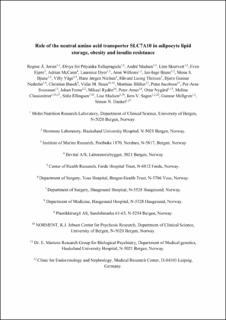Role of the Neutral Amino Acid Transporter SLC7A10 in Adipocyte Lipid Storage, Obesity and Insulin Resistance
Jersin, Regine Åsen; Tallapragada, Divya Sri Priyanka; Madsen, André; Skartveit, Linn; Fjære, Even; McCann, Adrian; Dyer, Laurence; Willems, Aron; Bjune, Jan-Inge; Bjune, Mona Synnøve; Våge, Villy; Nielsen, Hans Jørgen; Thorsen, Håvard Luong; Nedrebø, Bjørn Gunnar; Busch, Christian; Steen, Vidar M.; Blüher, Matthias; Jacobson, Peter; Svensson, Per-Arne; Fernø, Johan; Rydén, Mikael; Arner, Peter; Nygård, Ottar; Claussnitzer, Melina; Ellingsen, Ståle; Madsen, Lise; Sagen, Jørn V.; Mellgren, Gunnar; Dankel, Simon N
Journal article, Peer reviewed
Accepted version
Permanent lenke
https://hdl.handle.net/11250/2761061Utgivelsesdato
2021Metadata
Vis full innførselSamlinger
- Department of Clinical Science [2318]
- Registrations from Cristin [9791]
Sammendrag
Elucidation of mechanisms that govern lipid storage, oxidative stress, and insulin resistance may lead to improved therapeutic options for type 2 diabetes and other obesity-related diseases. Here, we find that adipose expression of the small neutral amino acid transporter SLC7A10, also known as alanine-serine-cysteine transporter-1 (ASC-1), shows strong inverse correlates with visceral adiposity, insulin resistance, and adipocyte hypertrophy across multiple cohorts. Concordantly, loss of Slc7a10 function in zebrafish in vivo accelerates diet-induced body weight gain and adipocyte enlargement. Mechanistically, SLC7A10 inhibition in human and murine adipocytes decreases adipocyte serine uptake and total glutathione levels and promotes reactive oxygen species (ROS) generation. Conversely, SLC7A10 overexpression decreases ROS generation and increases mitochondrial respiratory capacity. RNA sequencing revealed consistent changes in gene expression between human adipocytes and zebrafish visceral adipose tissue following loss of SLC7A10, e.g., upregulation of SCD (lipid storage) and downregulation of CPT1A (lipid oxidation). Interestingly, ROS scavenger reduced lipid accumulation and attenuated the lipid-storing effect of SLC7A10 inhibition. These data uncover adipocyte SLC7A10 as a novel important regulator of adipocyte resilience to nutrient and oxidative stress, in part by enhancing glutathione levels and mitochondrial respiration, conducive to decreased ROS generation, lipid accumulation, adipocyte hypertrophy, insulin resistance, and type 2 diabetes.
